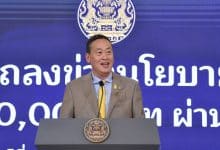Delayed launch of Thailand’s 500 billion baht digital wallet rattles government

The much-anticipated 500-billion-baht (US$14.3-billion) digital wallet initiative, a flagship policy of the Pheu Thai-led government, has hit a snag. The planned rollout for May has been deferred, according to Deputy Finance Minister Julapun Amornvivat, delivering a blow to Prime Minister and Finance Minister Srettha Thavisin’s coalition government, which has been promoting the scheme as a lifeline for the faltering economy.
The initiative, designed to inject 10,000 baht (approximately US$285) into the hands of 50 million Thais for spending within their localities, will not meet its May launch, Julapun announced without indicating a new timeline.
This setback follows an initial delay from the original February launch date for the programme, which would have facilitated Thais receiving funds through a mobile application. The digital wallet was a central campaign promise of the ruling Pheu Thai Party and forms a significant part of wider stimulus measures pledged by PM Srettha’s administration for Southeast Asia’s second-largest economy. These measures include debt relief for farmers and a minimum wage increase, reported Bangkok Post.
The funds from the digital wallet scheme are earmarked strictly for food and consumer goods. They are not allowed for the purchase of online goods, cigarettes, alcohol, cash vouchers and high-value items such as diamonds, gemstones, or gold. Furthermore, the funds cannot be employed to settle debts or cover utility bills, fuel costs, natural gas, or tuition fees. The funds must instead be spent within the district where the recipient’s home is registered.
In a recent development, the National Anti-Corruption Commission (NACC) issued a caution to the government about potential legal issues with the proposed digital wallet scheme.
In related news, the government remains undeterred as it stands firm on its 10,000-baht digital wallet scheme, scheduled for a May launch, despite legal challenges.
The 61 year old Thai prime minister promised a consensus after seeking opinions from key players.
Latest Thailand News
Follow The Thaiger on Google News:


























